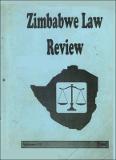| dc.contributor.author | Ncube, Welshman | |
| dc.contributor.author | Mohamed-Katerere, Jennifer | |
| dc.contributor.author | Chenje, Munyaradzi | |
| dc.coverage.spatial | Zimbabwe. | en |
| dc.date.accessioned | 2015-09-11T13:31:06Z | |
| dc.date.available | 2015-09-11T13:31:06Z | |
| dc.date.issued | 1996 | |
| dc.identifier.citation | Ncube, W., Mohamed-Katerere, J. and Chenje, M. (1996) Towards the Constitutional Protection of Environmental Rights in Zimbabwe. Zimbabwe Law Review (ZLRev), vol. 13, (pp. 97-133). UZ, Mt. Pleasant, Harare: Faculty of Law (UZ). | en |
| dc.identifier.uri | https://opendocs.ids.ac.uk/opendocs/handle/20.500.12413/6949 | |
| dc.description | A ZLRev. article on the legally constituted rights for the protection of the environment and ecology of Zimbabwe. | en |
| dc.description.abstract | The increasing emphasis on environmental protection and ecological preservation, as well as Zimbabwe's crisis of development make it eminently desirable to analyse the conceptual values in which environmental law is based. It has been stressed that environmental law derives from the common interest of mankind, as does international recognition of human rights and freedom. It is thus normal that a link was established between the two as early as 1972, by the Stockholm Declaration itself which stated that:
Man (sic) has the fundamental rights of freedom, equality, and adequate conditions of life, in an environment of a quality that permits a life of dignity and well being, and he bears a solemn responsibility to protect and improve the environment for present and future generations.’
Thus, "the right to environment" was proclaimed at the beginning of the "environmental era" at a worldwide level. In addition, as it is formulated, this principle includes all the essential elements of both old and new fields of international law. It is very clearly linked with human rights, civil, political (freedom, equality, dignity) economic, social and cultural rights (adequate conditions of life, well being). It also warns that everybody has a responsibility for the protection and improvement of the environment. Finally, and this is new in human rights language, it also opens a time perspective by speaking of future generations. | en |
| dc.language.iso | en | en |
| dc.publisher | Faculty of Law, University of Zimbabwe (UZ) | en |
| dc.rights.uri | http://creativecommons.org/licenses/by-nc-nd/3.0/ | en |
| dc.subject | Environment | en |
| dc.subject | Rights | en |
| dc.title | Towards the Constitutional Protection of Environmental Rights in Zimbabwe | en |
| dc.type | Article | en |
| dc.rights.holder | University of Zimbabwe (UZ) | en |


